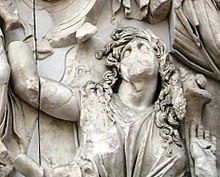| Gaia | |
|---|---|
Personification of the Earth | |
| Member of Primordial Gods | |
 Gaia pleading for her sons the Gigantes (Giants), detail of the Gigantomachy frieze, Pergamon Altar, Pergamon museum, Berlin | |
| Other names | Ge Gaea |
| Greek | Γαῖα, Γῆ |
| Parents | None (Hesiod)[1] |
| Consort | Uranus, Pontus, Tartarus |
| Offspring | Uranus, Pontus, the Ourea, the Hecatonchires, the Cyclopes, the Titans, the Gigantes, Nereus, Thaumus, Phorcys, Ceto, Eurybia, Tritopatores, Typhon |
| Equivalents | |
| Roman | Terra |
| Part of a series on |
| Ancient Greek religion |
|---|
 |
| Greek deities series |
|---|
| Primordial deities |
In Greek mythology, Gaia (/ˈɡeɪə, ˈɡaɪə/;[2] Ancient Greek: Γαῖα, romanized: Gaîa, a poetic form of Γῆ (Gê), meaning 'land' or 'earth'),[3] also spelled Gaea (/ˈdʒiːə/),[2] is the personification of Earth.[4] Gaia is the ancestral mother—sometimes parthenogenic—of all life. She is the mother of Uranus (Sky), from whose sexual union she bore the Titans (themselves parents of many of the Olympian gods), the Cyclopes, and the Giants, as well as of Pontus (Sea), from whose union she bore the primordial sea gods. Her equivalent in the Roman pantheon was Terra.[5]
- ^ Hesiod, Theogony 116–122 states that Gaia, Tartarus and Eros come after Chaos, but this does not necessarily mean they are the offspring of Chaos. Gantz, pp. 4–5 Archived 2023-09-24 at the Wayback Machine writes that, "[w]ith regard to all three of these figures—Gaia, Tartaros, and Eros—we should note that Hesiod does not say they arose from (as opposed to after) Chaos, although this is often assumed". Hard 2004, p. 23 says that "[a]lthough it is quite often assumed that all three are born out of Chaos as her offspring, this is not stated by Hesiod nor indeed implied, governed by the same verb geneto ('came to be'). Gaia, Tartaros and Eros are best regarded as being primal realities like Chaos that came into existence independently of her". Similarly, Caldwell, pp. 3, 35 says that the Theogony "begins with the spontaneous appearance of Chaos, Gaia, Tartaros, and Eros (116–122). By their emergence from nothing, without sources or parents, these four are separated from everything that follows."
- ^ a b Wells, John (3 April 2008). Longman Pronunciation Dictionary (3rd ed.). Pearson Longman. ISBN 978-1-4058-8118-0.
- ^ γῆ, γᾶ, γαῖα. Liddell, Henry George; Scott, Robert; A Greek–English Lexicon at the Perseus Project.
- ^ Smith, "Gaea".
- ^ Larousse Desk Reference Encyclopedia, The Book People, Haydock, 1995, p. 215.